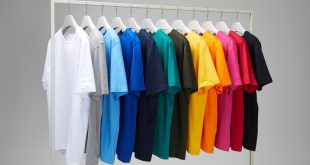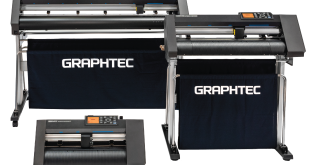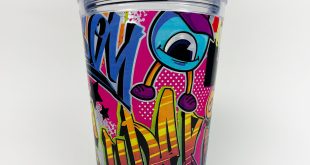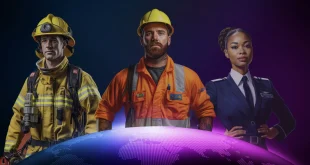
Today’s world of fashion and retail is heavily influenced by a culture of individualism. Leading the way in this field is YR Store with its unique approach to in store and online customisation and personalisation. P&P editor Melanie Attlesey sat down with co-founder Tim Williams to find out more.
Situated down a rather non-descript Shoreditch street is where you will find YR Store’s UK headquarters.
I say UK, because in the short six years that YR Store has been operational, the business has expanded overseas with offices in Japan, Hong Kong and the United States.
YR Store as a business was founded in 2013 by Tim Williams and Tom Hogan. The pair had a strong background in technology and a love of streetwear and urban fashion and wanted a way to combine the two. And so, YR Store set about creating a piece of software that would enable the user to design their own unique T shirt design live in front of them, as Tim explains: “We believed that if people could see that you could reinvent the retail experience and do everything live, i.e. coming into the store, making a design and seeing it printed out, it would be amazing! That was the birth of YR Store.”
YR Store’s first foray into the retail world was a seven-week pop-up store in Carnaby Street, London. This was a huge success and word quickly got around among high-end retailers in the Oxford Street and Regent Street area of London. By the end of 2013, YR Store had permanent installations in Topshop, Topman, Selfridges, as well as a YR Store-branded pop-up shop in Box Park, Shoreditch.
“Suddenly everywhere you looked there was a YR Store,” exclaims Tim.
Change in direction
However, this bubble was about to burst as Tim explains, it was very difficult to be profitable by working in this format.
“In the heady days of when we were running our own stores, we were selling up to 150 T shirts a day in Topman. When we first launched, it was like a crazy ramble of people trying to get their own product made.
“How we sold ourselves at the time was that we were a custom fashion brand. Everything we did was customised. We were turning fashion on its head in the sense that the whole point of the brand was that everything was customised. It wasn’t a case of we’re a custom T shirt shop, we’re a fashion brand and everything is made just for you uniquely.
“The problem was we were ahead of our time. We were the new to the fashion part and that was the issue. We were approaching it from a tech point of view, but with a love of streetwear and all over prints. Perhaps someone from a fashion background would have curated it better.
“From a management point of view, on one hand we were a software, tech type business that had opened a brand to showcase what we did and then we effectively had to diversify into becoming a retail store, which was tricky in terms of managing staff and all the other aspects that go with running a retail store. This was not just a retail store, but was a new concept that people did not necessarily understand or had seen before.
“From a money making point of view, we relied heavily on volume. If you imagine Top Shop, we had a 3x3m space where we did the printing, Topshop could have filled that with denim and T shirts, but we needed to fill it with three full-time members of staff to do the printing and that was the difficulty with us doing the live printing. We weren’t really charging a premium for the product, but we were staffing quite heavily because it’s quite a labour intensive process at the point of consumption. The costs of running retail stores and a tech brand didn’t add up,” explains Tim.
Cue a change in direction for YR Store. In 2015, YR Store closed all of its stores and quietly removed itself from the retail world. Rather than be a fashion brand, the team took the decision to work with brands and help them achieve their customisation dreams in their own stores.
“One of our big selling points to the brands is that we have run our own retail stores, we know what the customers want from in store customisation, we know how to keep it simple. All the learnings that we made from our retail experience, we can pass on to the brands,” says Tim.
Software is the core
At the core of what YR Store does is the software. The software that YR Store has created allows the customer to make their own personalised design and then send that design seamlessly through to the printer or embroidery machine. A piece of software can be customised to each brand’s own customisation needs.
With offices around the world, Tim is in the unique position of seeing how the personalisation market differs from country to country and as he says, there are definitely quirks to each market.
For example, over in the States, events, exhibitions and conferences are big business. Companies use YR Store’s software as a way to print on demand for visitors as a reward for coming on to their stand or filling in a quick survey. Tim provides this example: “A big side of our business is the promotion side. For example an insurance company will pay us to go to an insurance conference and allow guests to create a design on a touch screen and give the product away. The insurance company is effectively paying us to provide a service at an event to give a gift of a customised product. The promotional products industry is worth $20 billion in the US alone and it’s pens, T shirts, tote bags, all that sort of stuff. Our argument is instead, of pre-printing these products, why not print them live at the event and create the experience. You get people onto your exhibition stand, you get people to talk to you at your conference. You create a spectacle and a buzz by having this live printing aspect on your stand.
“For events we can actually collect data as well. As long as we’re upfront with people and they know their data is going to be kept in a GDPR compliant way, it’s actually a very effective way of getting really good data.”

While over in Japan, merchandise is the growth market. “In Tokyo, the Japanese business has seen a lot of success with online music merch. The company works with two of the biggest labels over there. These labels will have a roster of artists under them, who have a massive loyal following. Now, imagine a supermarket filled with products with your favourite band on them all from the same label. Towels, sweets, protein shakes, shoes, every sort of product you can imagine from apparel through to knickknacks for your house all branded with the band merch. They just fly out the door,” explains Tim. “We do do some live printing in these stores, but where we are seeing the real growth in Tokyo is this online platform where you can go in as a fan and check the progress of your group and what the latest news is and also create your own custom product or on demand product which isn’t customised. We are fulfilling these orders. We’ve got a print set up, a factory called the Garage which is able to print and ship these orders direct to the customer. It’s the same business offering, but they are really focused on the online and production aspect.”
The on-demand market
After cracking the online and in store customisation business model, the next move for YR Store is to target the on-demand market. YR Store is currently working on a project in a bid to change the way fashion is manufactured and to turn the phrase ‘fast fashion’ on its head.
As the project is currently being kept under wraps, Tim can only go into so much detail, but he is able to give a brief outline of how this will work: “As an order is placed on a retailer’s e-commerce site, whether that’s a customised or simply a pre-existing design, it is only at that point that it will be printed or embroidered. Each item will be one of one.
“That’s the clever part. Manufacturing like this means you don’t get any waste, or very little waste, and you are also super responsive to trends. This is 2019 and if your supply chain is a year long, then you have definitely got some issues. We see the future of retail being much more responsive and offering greater variety, which changes weekly. Sort of like the next frontier of fast fashion. Fast fashion has got real negative connotations and it doesn’t need to have” explains Tim.
Customisation and personalisation is changing the way consumers shop and will soon change the way fashion is manufactured in the 21st century. YR Store intends to be at the forefront of this revolution.
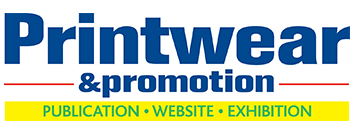 Printwear & Promotion The Total Promotional Package
Printwear & Promotion The Total Promotional Package
